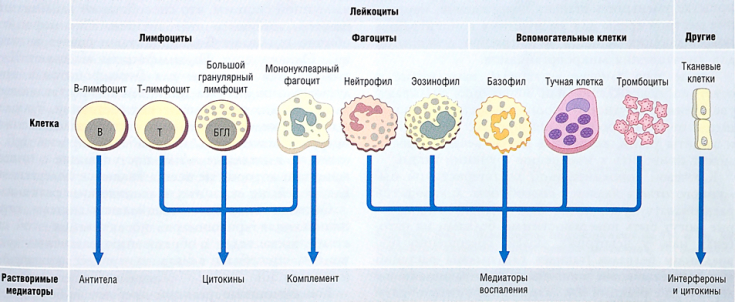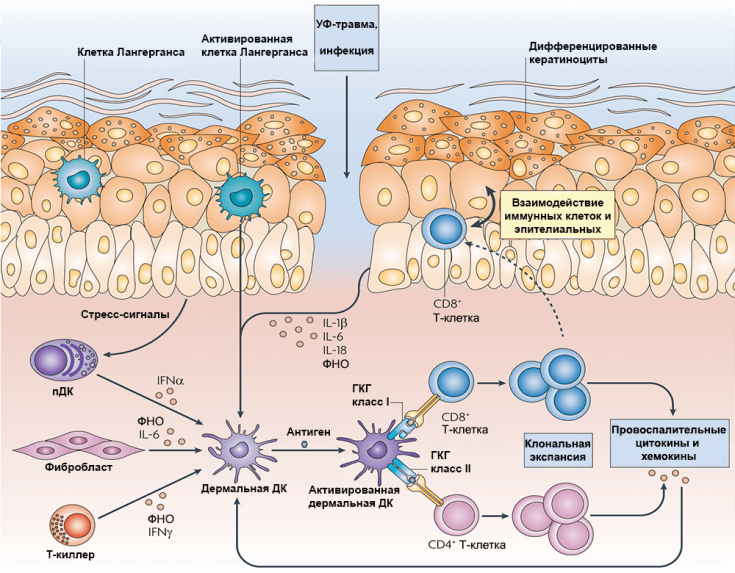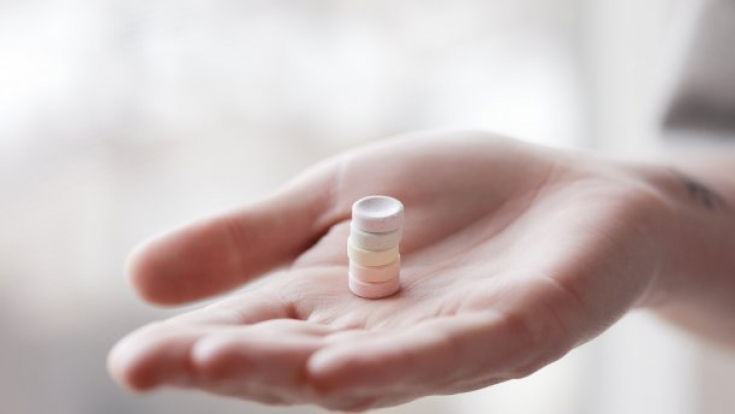The skin, like the thymus, is an important immune organ. Some types of immune cells mature in the skin structures and immunological reactions occur.
The skin barrier contains all types of cells capable of carrying out a wide range of immune responses.
The skin is the first barrier to the penetration of foreign elements.
The skin is the first to react to the introduction of antigens and may signal the presence of an inflammatory process in the body.
Read this article about the main immune cells of the skin, the mechanisms of the immune response, as well as ways to improve skin immunity.
Anatomical and functional similarity of thymus cells with skin cells
The skin plays an important role in the processes of immunity. The immune function of the skin is provided by a number of specialized cells.
The main elements of the immune system of the skin are keratinocytes, epidermal T-lymphocytes, Langerhans cells, neutrophils, basophils and eosinophils.

Keratinocytes promote the maturation of T-lymphocytes by influencing them with the enzyme deoxyribonucleotidyltransferase (DRNT).
Keratinocytes produce a number of important biologically active substances that are involved in immune and inflammatory reactions.
These include:
• interleukins;
• leukotrienes;
• prostaglandins;
• fatty acid hydroxides;
• Plasminogen activator and inhibitor.
The similarity of keratinocytes with thymic epithelial cells is confirmed by common heteroantigens that are found in the basal cells of the epidermis and the hormonal epithelium of the thymus.
It has been proven that thymus cells, when cultivated, turn into typical epithelial keratinocytes.
In the deep structures of the thymus bodies, antigens characteristic of the prickly, granular and horny layers of the epidermis were found.
It follows that the immune function of the skin is anatomically and functionally similar to that of the thymus.
Lymphocytic system of the skin: main immune markers and cells
The immune function of the skin is impossible without the most important cells of humoral immunity – lymphocytes.
Normally, lymphoid skin cells are predominantly represented by T-lymphocytes. About a third of skin lymphocytes are T-helpers (CD4+). All of them have a rather specific common marker — skin lymphocytic antigen (CLA). The receptor is an adhesive molecule on the membrane, which ensures the binding of the T-lymphocyte to the endothelium of post-capillary venules of the skin and its transition to the dermis.
The antigen-specific T-cell response consists in the formation of blast forms of T-lymphocytes, which return to areas of the skin containing the antigen.
 Skin T cells are able to differentiate into cytotoxic or memory cells (CD45RO). Memory cells form in the lymph nodes that drain the skin and return to the skin when inflamed. Normally, they are involved in the formation of skin immunity, and in pathology they are involved in the pathogenesis of such conditions as cutaneous T-cell lymphoma, transplant rejection, atopic dermatitis and other immunopathological diseases. B: benefits for skin and body
Skin T cells are able to differentiate into cytotoxic or memory cells (CD45RO). Memory cells form in the lymph nodes that drain the skin and return to the skin when inflamed. Normally, they are involved in the formation of skin immunity, and in pathology they are involved in the pathogenesis of such conditions as cutaneous T-cell lymphoma, transplant rejection, atopic dermatitis and other immunopathological diseases. B: benefits for skin and body
How to improve skin immunity: effective methods and preparations
Under the condition of inhibition of skin immunity, it is necessary to stimulate its immune and protective properties.
For these purposes, it is recommended to use preparations containing polyoxidonium and glucosaminylmuramyl dipeptide.
Some immunomodulators (for example, inosine) have proven themselves well. They can be used both for systemic and local use, including in mesotherapeutic techniques. Intradermal injections affect mainly the immune system of the skin, while systemic application leads to the activation of lymphopoiesis in the thymus and lymph nodes.
The immune function of the skin is significantly increased when using non-specific adaptogens (vitamin complexes, aralia tincture, etc.). In the treatment of diseases caused by increased reactivity of the immune system (psoriasis, lymphomas), immunosuppressants (cyclosporine) are used.
The latest achievement in immunopharmacology is the use of monoclonal antibodies as inhibitors of the immune system.
The immune function of the skin depends on many factors: endogenous and exogenous. High doses of ultraviolet radiation, aggressive cosmetics, bad habits, stress, chronic infections, as well as non-compliance with a balanced diet have a negative impact on the protective abilities of the skin.
 Thank you for staying with estet-portal.com. You may also be interested in other articles in the "Dermatology" section:
Thank you for staying with estet-portal.com. You may also be interested in other articles in the "Dermatology" section:







Add a comment